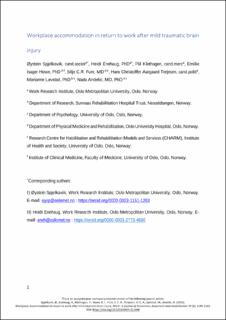| dc.contributor.author | Spjelkavik, Øystein | |
| dc.contributor.author | Enehaug, Heidi | |
| dc.contributor.author | Klethagen, Pål | |
| dc.contributor.author | TERJESEN, Hans Christoffer Aargaard | |
| dc.contributor.author | Howe, Emilie Isager | |
| dc.contributor.author | Fure, Silje Christine Reistad | |
| dc.contributor.author | Løvstad, Marianne | |
| dc.contributor.author | Andelic, Nada | |
| dc.date.accessioned | 2024-02-21T13:28:18Z | |
| dc.date.available | 2024-02-21T13:28:18Z | |
| dc.date.created | 2023-02-01T11:02:40Z | |
| dc.date.issued | 2023 | |
| dc.identifier.citation | Work : A journal of Prevention, Assesment and rehabilitation. 2023, 74 (3), 1149-1163. | en_US |
| dc.identifier.issn | 1051-9815 | |
| dc.identifier.issn | 1875-9270 | |
| dc.identifier.uri | https://hdl.handle.net/11250/3119071 | |
| dc.description.abstract | Background: While a vast amount of research focuses on unmodifiable and individual factors that may impact return to work (RTW) for patients with traumatic brain injury (TBI), less knowledge exists of the relationship between specific workplace factors and work retention.
Objective: Identify types of accommodation in the workplace that influence the RTW process for employees with TBI and the challenges associated with them.
Methods: A multiple case study consisting of 38 cases and 109 interviews of employees with TBI and their managers conducted between 2017 and 2020 at two time points.
Results: Accommodation of both the organizational and psychosocial work environment influences RTW for employees with TBI. Social support and supportive management may have positive and negative effects. RTW is often not a linear process. Over time, maintaining and developing customized accommodation in the work organization is challenging.
Conclusions: Uncertainty about accommodation in RTW for employees with TBI is closely linked to lack of knowledge in the workplace of how to handle complex and nonlinear RTW processes. Work-oriented rehabilitation should to a greater extent provide managers with relevant information and support to develop the person-environment fit over time. | en_US |
| dc.language.iso | eng | en_US |
| dc.publisher | IOS Press | en_US |
| dc.relation.ispartofseries | Work : A journal of Prevention, Assesment and rehabilitation; | |
| dc.title | Workplace accommodation in return to work after mild traumatic brain injury | en_US |
| dc.type | Peer reviewed | en_US |
| dc.type | Journal article | en_US |
| dc.description.version | acceptedVersion | en_US |
| cristin.ispublished | true | |
| cristin.fulltext | postprint | |
| cristin.qualitycode | 1 | |
| dc.identifier.doi | https://doi.org/10.3233/WOR-211440 | |
| dc.identifier.cristin | 2121641 | |
| dc.source.journal | Work : A journal of Prevention, Assesment and rehabilitation | en_US |
| dc.source.volume | 74 | en_US |
| dc.source.issue | 3 | en_US |
| dc.source.pagenumber | 1149-1163 | en_US |
